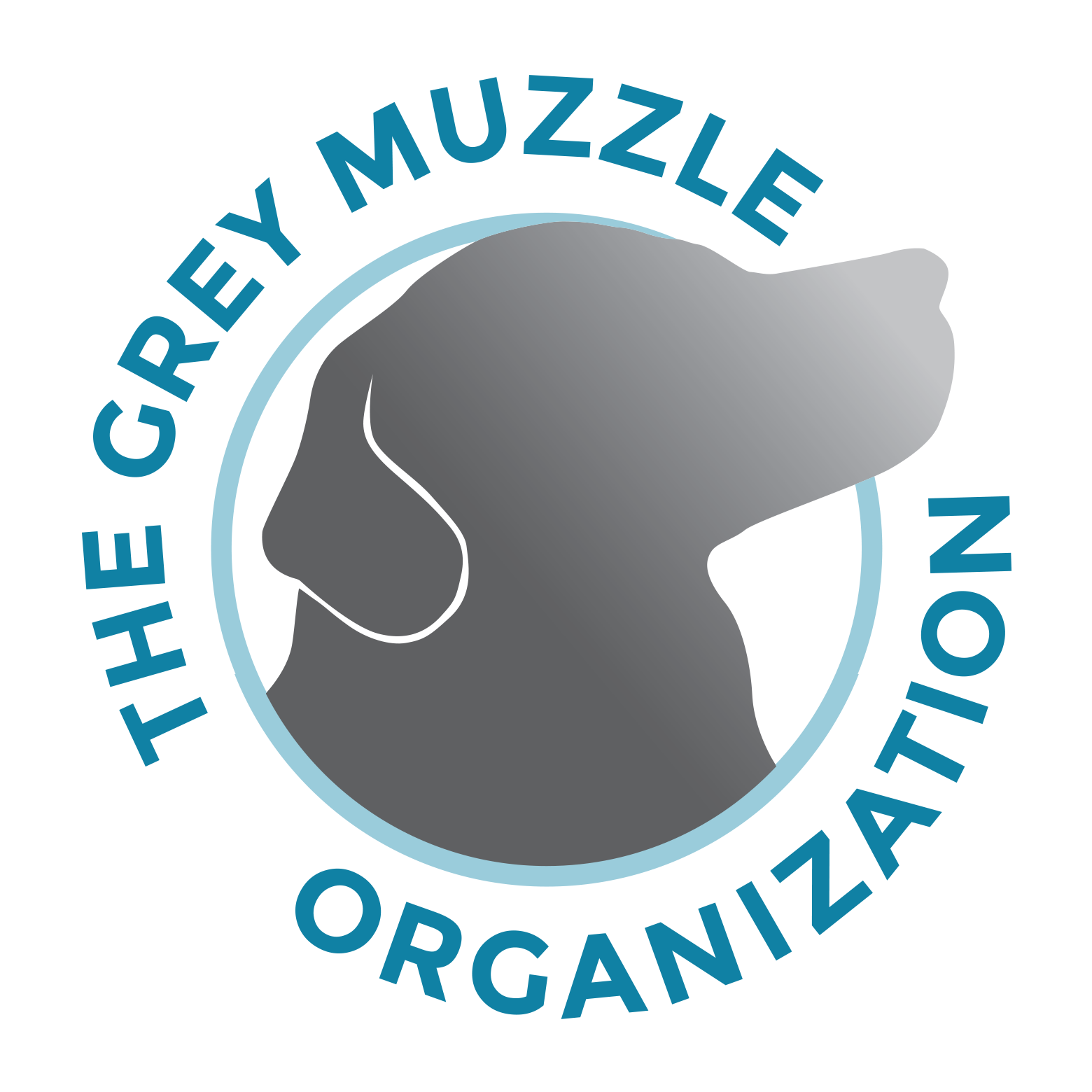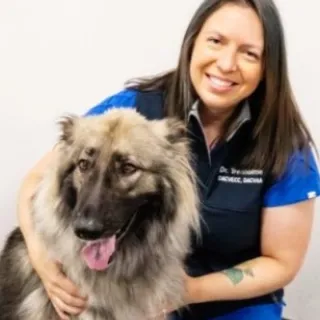Canine Respiratory Illness: What We Know
In January 2024, Grey Muzzle invited Dr. Geri Lake-Bakaar to discuss the uptick in cases of atypical canine respiratory disease reported in many states. Canine Infectious Respiratory Disease Complex (CIRDC), also known as “kennel cough,” is a highly contagious illness that affects a dog’s respiratory tract.
Over the past few months, reports of increased frequency and severity of CIRDC cases have caused alarm among pet parents. In this webinar, Dr. Lake-Bakaar helped explain what we know about it so far and what we can do to keep our beloved dogs safe.
What is CIRDC?
It is unknown whether a bacteria or a virus causes the currently circulating respiratory illness. What we do know is that it is transmitted between dogs via respiratory droplets. There is no evidence that the disease can pass between dogs and humans or between dogs and other animals like cats. This illness occurs most commonly in animals housed in high-density settings like shelters and boarding facilities. It is important to note that most cases are mild.
Dr. Lake-Bakaar explained that a new pathogen isn’t the likely cause of this current outbreak. It is more likely that this is an existing virus or bacteria that has either changed slightly and is affecting more dogs or simply seems to be infecting more dogs. CIRDC is endemic, which means it is regularly seen and diagnosed in dogs and has been circulating for many years.
There are at least a dozen known causes of CIRDC, including bacterial and viral infections. Most cases occur in dogs with a history of interaction with many other dogs, meaning frequent boarding, doggie daycare, or time in a shelter environment.
Why is this happening now?
We don’t know everything about CIRDC right now, but scientists do have some compelling theories related to the human COVID-19 pandemic. During COVID, dog ownership skyrocketed, meaning more dogs are out there to get sick. Additionally, veterinary care was heavily disrupted due to lockdowns and lack of appointment times, resulting in an under-vaccinated dog population. There was also a prolonged period when the canine influenza vaccine wasn’t available, leading to more unprotected dogs. Dogs and their humans have finally begun to go out into the world again. The combination of more dogs with fewer vaccinations could result in an outbreak of what is usually a common illness.
What are the signs?
Signs that your dog may be suffering from CIRDC are:
- Coughing
- Sneezing
- Nasal and/or eye discharge
- Lethargy
If these symptoms are prolonged, they may be signs of mild illness. More severe cases may include startling symptoms of respiratory distress, such as:
- Increased respiratory rate or effort
- Open mouth breathing or puffing of the cheeks
- Outstretched neck
- Restlessness or inability to lay down
It’s important to remember that there may be multiple benign causes for some of the symptoms listed above. If your pet has recently been running or playing, watch to see if their symptoms persist during times of rest. If so, it may be time to contact your family veterinarian.
Stages of Illness
There are three major stages of severity that veterinarians use to classify a patient’s illness:
- Chronic Mild-Moderate Tracheobronchitis: Typical respiratory illness in dogs lasts about 2-3 weeks. However, some more serious cases of CIRDC can take 6-8 weeks to resolve with standard therapies.
- Chronic Pneumonia: This occurs when the dog’s illness does not respond to the antibiotics usually used to treat pneumonia.
- Rapidly Progressive Acute Pneumonia: This level of illness often requires hospitalization and may include necrotizing pneumonia, which is when the disease impacts the lung to the point where a veterinarian may suggest removing the organ.
Dr. Lake-Bakaar emphasizes that most dogs recover uneventfully without progressing to chronic illness.
High-risk Populations
A few populations of dogs may be either more likely to contract CIRDC or more likely to suffer from severe illness. These include elderly dogs who may have comorbidities, young puppies who don’t have a fully developed immune system, immunocompromised dogs or those undergoing cancer treatment, dogs with underlying cardiac or respiratory disease, and brachycephalic (squishy-faced) breeds like boxers, pugs, and French bulldogs.
When To Go To the Vet
If your dog shows signs of mild illness, it is sometimes best to wait it out at home. But, if they are developing symptoms rapidly and seem to be deteriorating quickly, it may be time to call your vet. Signs would include severe lethargy, not eating or drinking, having difficulty breathing, a cough that is causing significant problems like vomiting, or if they are not improving over several days. For high-risk populations, a vet visit may be wise earlier in the illness.
Testing and treatment depend on the severity of the illness. For mild symptoms, your vet may prescribe a cough suppressant and take a “wait-and-see” approach. If there are signs of pneumonia, including increased respiratory rate or high temperature, your vet may request chest x-rays and bloodwork and prescribe antibiotics. If your dog is suffering from pneumonia that is not responding to treatment or has severe symptoms, your vet may recommend hospitalization, oxygen therapy, and/or IV fluids.
Precautions for Dog Owners
There are many things dog owners can do to help protect our beloved pups from respiratory illness.
- Stay current on vaccinations recommended by your vet, with special consideration for the Bordetella and Canine Influenza vaccines. Intranasal administration is most effective for Bordetella, but some dogs do not like this method. In that case, oral administration is the next best option. For the Canine Influenza vaccine, it’s important to remember that this is a two-vaccine series. Make sure to follow up with the second dose for maximum protection!
- Avoid communal water bowls and toys
- Avoid playdates with unknown dogs (unknown vaccination and health history)
- Avoid or limit exposure in settings with unknown dogs, like off-leash dog parks
- If your dog is showing signs of respiratory illness, keep them at home and contact your veterinarian
Precautions for Dog-related Businesses
If your dog does require boarding or daycare, look for the following precautions to be taken by the facility:
- Requiring up-to-date vaccines, including Bordetella and Canine Influenza
- Screening for and not allowing dogs who are showing symptoms of illness
- Not allowing communal water bowls and cleaning them frequently
- Vigorous cleaning and disinfecting protocols. They should be using a chemical agent after every round of dogs.
- Ventilation and air filtration
- Hand washing and sanitizing between handling of dogs
The Bottom Line
Dr. Lake-Bakaar stresses that dog owners should use caution but that there is no need to panic. She recommends ensuring your pup is current on all vaccinations and avoiding contact with unvaccinated or sick dogs. If you have a dog in the high-risk population, take extra precautions. She also recommends monitoring reputable sources for information. She particularly likes the Worms and Germs Blog by Drs. Scott Weese and Maureen Anderson of the Ontario Veterinary College’s Centre for Public Health and Zoonoses.
About the Presenter
Dr. Geri Lake-Bakaar graduated from Harvard University in 2003 (BA), Cornell University in 2007, and the University of California, Davis (DACVIM, Cardiology) in 2013. Between veterinary school and her residency, she completed a rotating internship at the Animal Medical Center and a post-doctorate fellowship at Harvard/MGH. She is devoted to caring for all animals and providing compassionate, quality care to her patients. Geri is interested in education and provides continuing education lectures to veterinarians. She has also designed a series of client education materials. She is a section editor for an educational website on the Veterinary Information Network. Geri loves running races and riding her Peloton in her free time. Geri and partner Michael have two dogs (Max and Sir Fur), a horse (Brad), and a sassy 6-year-old daughter who also loves animals.



